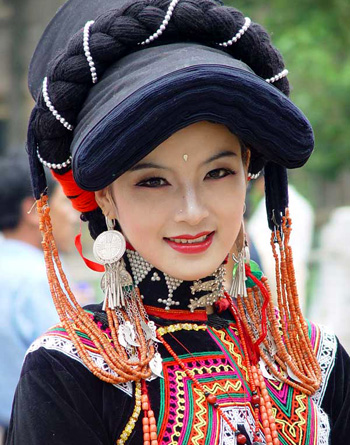Dress Changing Ceremony for the Yi Girls
Updated: 2007-08-15 09:08

Among the various rituals of the Yi ethnic minority in the Liangshan region of Southwest China's Yunnan and Sichuan provinces prevails a mysterious ceremony called "Dress Changing Ceremony," which is held for grown-up Yi girls. Referred to as "Shalaluo" in Yi language, the ceremony means changing children's clothes into adults' clothes.
Prior to the ceremony, the girls usually wear red and white striped children's skirts, and wear their long hair in a single braid. Instead of earrings, the girls wear a pair of ear threads. After the ceremony, they put on a long deep blue dress, and wear their long hair in two braids. Besides, they wear an embroidered handkerchief over their heads, and a pair of hanging earrings.
Only after the dress changing ceremony can the girls go shopping, watch horse racing, and develop a relationship on their own. The time for holding such a ceremony depends on the girl's maturity, with the ceremony being held when the girl is between the ages of 15-17 in most cases.
Usually, the locals choose to hold the ceremony in an odd rather than an even year, as they consider changing dress in an even year inauspicious. Elders are usually consulted when it comes to deciding the ceremony's date.
Since the ceremony marks a girl's transition from childhood to adulthood, the parents invariably pay much attention to it. The mother, who is her daughter's confidante and who best knows her daughter's psychology, will prepare all the accouterments needed at the ceremony, including a black lace handkerchief, a new dress, beads of different colors, and other silver ornaments.
On the day of the dress changing ceremony, the host family will give a banquet in honor of the guests, who have come to offer gifts and congratulations. According to local customs, only female friends and relatives are invited to take part in the ceremony; no man is allowed to stay during the dress changing ceremony.
The dress changing ceremony varies a lot in from place to place. In some areas, an adult woman sits under a fruit tree, beating a little pig to death. Then someone carries the dead pig around the girl of the ceremony so as to get rid of the evil spirits. After that, hanging earrings replaces the ear threads, the girl's hair is combed and a new dress is put on her. In other places, an object, such as a tree or a millstone, is designated as a husband, and the girl is then gorgeously dressed, much like a bride. Next, the girl rides on the back of an adult woman; the woman then circles around the designated husband three times. Thus, the girl is married.
In some places, only some amusing remarks and good wishes are made at the end of the ceremony; while in other places, the ceremony is held among songs and laughter.
The girl who has now changed into adults' clothes is usually asked very private questions such as, whom or what kind of men she likes. Confronted with such questions, the girl, who is now an adult, will not answer any of the questions directly. Rather, the girl sitting by her side often does it for her. In the end, the woman who asked the first question will sing a song, with lyrics like "wear the silver ornament on yourself / wear the beads stringed by the relatives / and choose your love on your own."
When all the hustle and bustle is over, a pretty and capable woman is invited to comb the girl's hair and help her put on the handkerchief. Then dazzling eardrops (hanging earrings) are put on before the girl is dressed into the long dress, which is the most beautiful moment, bringing the whole ceremony to a climax.
Not until the ceremony is finished are the men allowed to join in the banquet, indulging themselves in the delicious food and wine.
If a girl has changed dress, she has become an adult, which means she can find her love and have a romantic relationship with anyone she likes. As long as a sexual relationship does not go beyond the limit of social stratum and blood relationship, the man will not be punished in accordance with the Custom Law. If the woman becomes pregnant, the man has to apologize or marry the woman.
In contrast, the girl who has not entered adulthood is strictly protected, and men are not allowed to flirt with, seduce, or cohabit with such a girl. Any of the forbidden conduct will be severely punished according to the Custom Law.